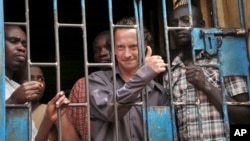KAMPALA —
Uganda has deported a British theatre producer charged with staging a play about homosexuality, the British High Commission said on Tuesday.
Homosexuality is illegal in Uganda and further legislation on the issue, awaiting debate in parliament, has drawn criticism from donors including the United States.
Producer David Cecil, 35, was deported from the east African country late on Monday aboard a KLM flight, and arrived in the UK on Tuesday morning, British High Commission spokesperson Chris Ward said.
A court threw out a case against Cecil last month. He had been charged with disobeying a public official last September after ignoring orders to cancel a theatre production with a gay leading character.
Cecil, who denied being a gay rights activist, could have faced two to four years in jail in the religiously conservative country if convicted.
"We are extremely disappointed and obviously concerned that David was being deported without being given an opportunity to challenge the deportation order which would be through the Ugandan courts,'' Ward told Reuters.
He said he had not arranged a meeting with Ugandan officials yet "but we fully intend to do so. It's obviously key... [for] the UK government to know that due process is being followed,'' he said.
Immigration officials were not available for comment after the deportation, but have told Reuters there was a direct ministerial order to deport Cecil. A spokesperson said the ministry would issue a statement later.
Uganda's immigration act enables the deportation of any foreigner declared by the minister of internal affairs to be an ``undesirable immigrant''.
Fridah Mutesi, one of Cecil's lawyers and a gay rights activist, said they still intended to challenge the validity of the deportation order by filing a case to the high court.
Cecil's partner, Florence Kebirungi, said she last heard from him at about 6pm (0300 GMT) on Monday night.
"He called me briefly when he was at the airport to say 'Can you call the lawyers' and then before I could reply, he hung up,'' she said.
Uganda's latest legislative proposals include a charge of "`promotion of homosexuality'' which could mean up to seven years in prison for activists, artists, lawyers and even health workers convicted of "funding and sponsoring... homosexuality and related activities.''
Uganda's Minister of Ethics and Integrity Simon Lokodo has already been enforcing that clause in recent months to clamp down on gay rights activism, and had promised a "fresh investigation'' into Cecil after he was cleared last month.
A previous bill, denounced as "odious'' by U.S. President Barack Obama, had proposed the death penalty for gays.
Homosexuality is illegal in Uganda and further legislation on the issue, awaiting debate in parliament, has drawn criticism from donors including the United States.
Producer David Cecil, 35, was deported from the east African country late on Monday aboard a KLM flight, and arrived in the UK on Tuesday morning, British High Commission spokesperson Chris Ward said.
A court threw out a case against Cecil last month. He had been charged with disobeying a public official last September after ignoring orders to cancel a theatre production with a gay leading character.
Cecil, who denied being a gay rights activist, could have faced two to four years in jail in the religiously conservative country if convicted.
"We are extremely disappointed and obviously concerned that David was being deported without being given an opportunity to challenge the deportation order which would be through the Ugandan courts,'' Ward told Reuters.
He said he had not arranged a meeting with Ugandan officials yet "but we fully intend to do so. It's obviously key... [for] the UK government to know that due process is being followed,'' he said.
Immigration officials were not available for comment after the deportation, but have told Reuters there was a direct ministerial order to deport Cecil. A spokesperson said the ministry would issue a statement later.
Uganda's immigration act enables the deportation of any foreigner declared by the minister of internal affairs to be an ``undesirable immigrant''.
Fridah Mutesi, one of Cecil's lawyers and a gay rights activist, said they still intended to challenge the validity of the deportation order by filing a case to the high court.
Cecil's partner, Florence Kebirungi, said she last heard from him at about 6pm (0300 GMT) on Monday night.
"He called me briefly when he was at the airport to say 'Can you call the lawyers' and then before I could reply, he hung up,'' she said.
Uganda's latest legislative proposals include a charge of "`promotion of homosexuality'' which could mean up to seven years in prison for activists, artists, lawyers and even health workers convicted of "funding and sponsoring... homosexuality and related activities.''
Uganda's Minister of Ethics and Integrity Simon Lokodo has already been enforcing that clause in recent months to clamp down on gay rights activism, and had promised a "fresh investigation'' into Cecil after he was cleared last month.
A previous bill, denounced as "odious'' by U.S. President Barack Obama, had proposed the death penalty for gays.





